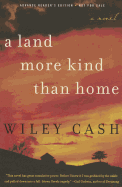
In his debut novel, A Land More Kind Than Home, Wiley Cash has written a superb story of good and evil in a small town in North Carolina. He's a natural storyteller, and his penchant for detail never slows the narrative; it gives dimension to his characters, provides fully nuanced situations and makes it all eminently believable.
The story is told in three voices: Jess Hall, a nine-year-old boy; Clem Barefield, a middle-aged sheriff; and Adelaide Lyle, an octogenarian midwife who has been in the town most of her life. It all begins innocently enough when Jess and his older brother--everybody calls him Stump--are snooping around, as kids will, and see something they shouldn't. Stump is mute since birth, so there is little danger he can communicate what he saw, but the person observed cannot be sure. Jess, unseen by the person observed, is powerless to stop the juggernaut that has been launched.
Stump and Jess's mother, Julie, attends a local church whose charismatic leader, Carson Chambliss, is evil incarnate. He gives orders to his mesmerized flock requiring what amounts to ritual sacrifice. One Sunday evening, after Stump and Jess's unfortunate viewing, Stump goes to the service with his mother, at Carson's request, presumably for a "healing."
The sadness, guilt, anger and thirst for revenge experienced by right-thinking people not in Chambliss's thrall brings many long-hidden stories to the fore, and the precipitating event involving Stump brings about a cataclysmic ending as the story moves inexorably to its tragic consequence. Wiley Cash has written a beautifully rendered novel with a necessary catharsis and no happy ending. --Valerie Ryan, Cannon Beach Book Company, Ore.

